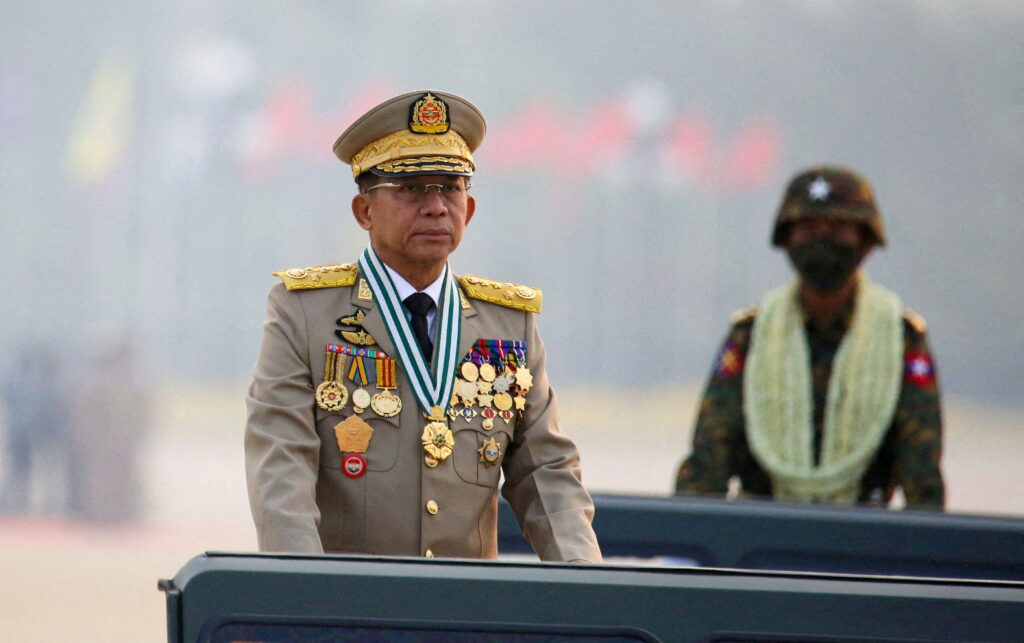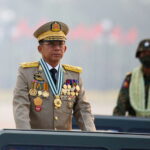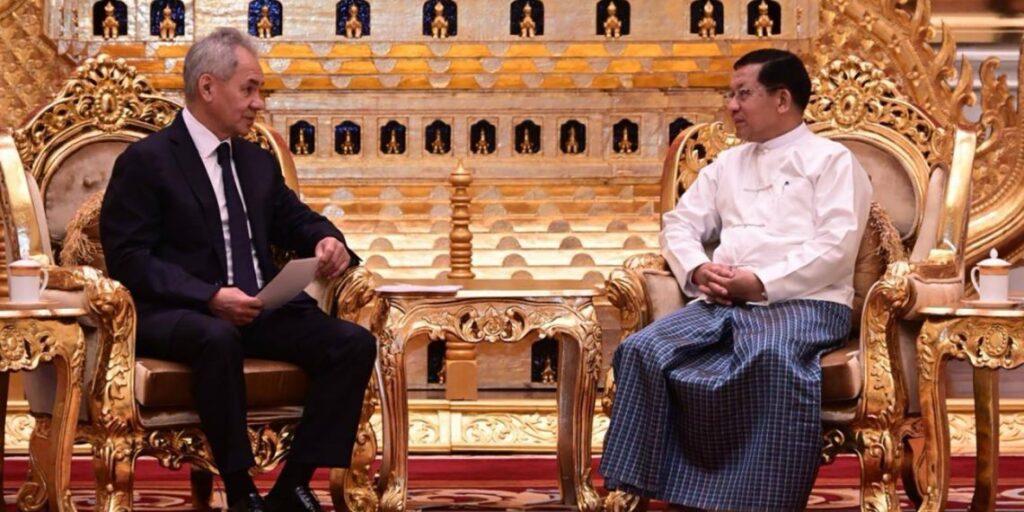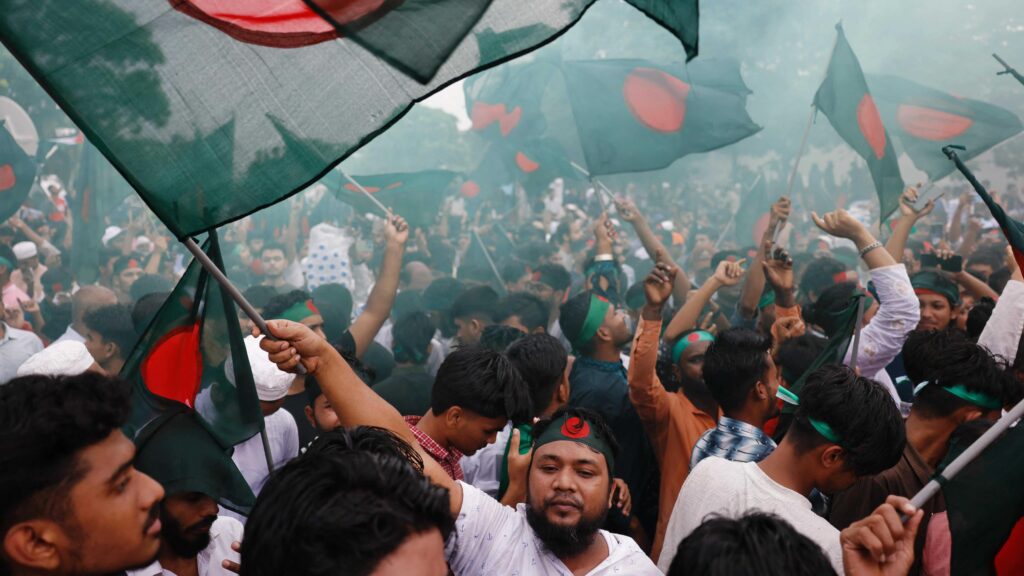MANTRAYA ANALYSIS# 81: 11 NOVEMBER 2024
BIBHU PRASAD ROUTRAY
Abstract
China’s backing seems to be a crucial factor influencing the trajectory of Myanmar’s civil war. At times, conflict theatres display signs of resolution. Battlefield victories by one side lead analysts to predict the end-game in a manner that turns out not to be reality. Myanmar serves as a prime example. Despite the territorial gains of the Three Brotherhood Alliance, the military junta remains firmly in power. The role of China as an external actor appears to be the key. This situation highlights the need for a proper framework for analysing state fragility and the state’s ability to endure. To accurately predict the outcomes of conflicts, it is essential to examine the roles of internal and external actors rather than focusing solely on battlefield victories or losses.

Introduction
If it weren’t for the violence and immense human suffering, the power struggle in Myanmar between the military Junta and the National Unity Government (NUG) over the past three and a half years could be likened to an unfinished game of chess. Since the coup of February 2021, both parties have experienced highs and lows, yet the end game is yet to unfold. When the military carried out the coup and unleashed a range of measures targeting the National League for Democracy (NLD) and other pro-democratic forces, it anticipated a quick victory. This proved far from the case. Within months, the counter-violence led by the People’s Defence Force (PDF) groups and the Ethnic Armed Organisations (EAOs) emerged as robust challengers to regime consolidation. The weakened military, which calls itself the State Administration Council (SAC), has struggled to implement much of its agenda. The NUG too isn’t anywhere close to achieving its objective of restoring democracy either. The unfolding of events imparts a lesson about state fragility versus the state’s enduring strength to survive with the assistance of external input.
A Matter of Metrics
The Junta’s continuing ability and determination to use violence is partly responsible for its survival. At least 5,938 civilians have been killed since the military seized power on 1 February 2021, according to the Assistance Association for Political Prisoners (Burma)[1]. Of the dead, 1,853 have died in custody. A total of 27,400 have been arrested. The United Nations, in September 2024, estimated that more than 3.3 million people have been internally displaced.[2] The objective for the Junta’s relentless violent campaign to restore order remains the same: to stage-manage elections that will legalise its hold over the country’s politics. Nevertheless, the NUG and the PDF groups and EAOs associated with it remain confident.
This contesting version of staying in power by the Junta and the NUG’s confidence in unseating the SAC has been brought about by two circumstances.
The first of these occurred in October 2023, the launch of Operation 1027 by Three Brotherhood Alliance (TBA), comprised of three powerful ethnic bodies — the Myanmar National Democratic Alliance Army (MNDAA), the Arakan Army (AA), and the Ta’ang National Liberation Army (TNLA) in northern Shan state – seemed to have tilted the strategic balance in favour of the NUG. Comprising of nearly 15,000 fighters, the offensive captured significant territory bordering China. It wasn’t a sudden offensive, rather a meticulous one that was backed by the use of sophisticated weapons amassed over the years and finances collected through licit and illicit sources.
The success of Operation 1027 was followed by another, Operation 1107 in November 2023, carried out by the Karenni Nationalities Defence Force (KNDF) in the western Karreni State. KNDF is the most powerful armed organisation operating there and is comprised of the Karenni National People’s Liberation Front (KNPLF), the Karenni Army (KA), and the PDF groups.
The rebels’ paired campaigns, targeting the Junta across the country, shook its control, strained its resources, undermined the morale of its soldiers, and resulted in a steady stream of defections. Numerous military posts fell, bases were captured, and townships slipped from Junta control. Among the latter were Laukkai, capital of the Kokang self-administered zone, which had emerged as a major global cyber-scam centre; Lashio, which houses the major regional military headquarters in the northern Shan state; and Mogok, the centre of the country’s lucrative gem-mining industry in the upper Mandalay region in July 2024.
Further, the AA captured almost all of Rakhine State after expanding Operation 1027 to western Myanmar. This included the Junta’s naval base in Thandwe township, which fell to the AA on 5 September.
The speed of these Operations, especially Operation 1027, led many analysts to predict the demise of the Junta, either through the momentum of military gains or through implosion, an internal coup of sorts by dissidents, dethroning the SAC chairman Min Aung Hlaing. Some Myanmar observers even hoped that the coordinated offensive would catalyse wider changes, leading to the collapse of the military administration. None of these predictions have become a reality.
The second major circumstance unfolded in September 2024. On 18 September, the MNDAA announced that it would no longer cooperate with the NUG. It further assured that the group would not attempt to capture either Taunggyi, the capital of the Shan State, or Mandalay, Myanmar’s second-largest city. This was a decisive moment favouring the SAC, made possible after an intervention by China. Beijing’s Shweli National Security Committee had issued a warning to the TNLA to cease hostilities immediately or face consequences.
Sceptics doubt that the halt in MNDAA’s anti-SAC offensive would be permanent, especially in the wake of an earlier effort by Beijing that resulted in a six-month-long ceasefire and broke down thereafter. In fact, since the group’s announcement, the remaining two partners in the TBA — the TNLA and the AA — have continued with their armed campaign. But the absence of MNDAA has taken the impetus out of their onslaughts.
The Junta, on the other hand, continues with its aerial bombing on towns controlled by anti-regime groups in northern Shan, Rakhine, Chin and Karenni states, and Mandalay and Magwe regions. Junta airstrikes killed 540 civilians, including 109 children, during the first ten months of 2024, according to the AAPP. At least 159 of the deaths occurred in Rakhine state. Sagaing region saw the second-most deaths by airstrike with 119.[3] The UN has termed such brutality “massive regressions in human rights that have been provoked by a vacuum of rule of law.”[4]
Enter the Dragon
The SAC’s fragility, which appeared beyond reasonable doubt a few months back, has turned out to be only a preponderance of probabilities. It is too early to predict a decisive swing in its favour, but it is attempting to capitalize on the situation. One the one hand, in September 2024, in an apparent sign of continuing weakness, the SAC offered to negotiate with the EAOs and PDF groups, only to be rebuffed. On the other hand, the SAC is moving to exploit the advantages gained as a result of the MNDAA’s halt of operations. It plans to carry out the much-delayed census and hold elections in 2025. Earlier, it had dissolved the NLD and other political parties. The elections, if held, will pave the way for a government that represents only the interests of the Junta.
This highlights the inherent power of the state, which gives it significant influence. The state continues to dominate in the application of force. Supported by the SAC leaders’ sense of impunity and backing from powerful external actors, China, to be sure, but also the tacit backing of India and Thailand, the state can withstand forces that may seem overwhelming at times. The following three factors thus have worked in favour of the Junta.
First, in December 2023, the MNDAA, following a series of unprecedented attacks on the military, announced, “The goal and purpose of the alliance groups and other resistance forces are the same. We are trying to eliminate the military dictatorship.” That wasn’t quite the entire story. The effectiveness of the anti-SAC operations needs to be seen in the context of the amalgamation of the two separate goals—the NUG’s larger goal of restoring democracy on the national scale and the EAOs’ goal of establishing their control over areas they consider their own. These objectives weren’t in conflict with one another but weren’t entirely in harmony, either. The fact that groups such as MNDAA, for all its commitment to overthrowing the SAC, haven’t been able to break away from Chinese control – and essentially remain tools in the hands of Beijing – works to the advantage of the Junta.
Second, the end-state envisioned by powerful external actors plays a dominant role. In Myanmar’s case, “what China wants” has always been the defining principle, shaping the course of the conflict. China seeks absolute control over the country, over its resources and also the territory that will give it direct access to the Indian Ocean. It is worried about a civil war spilling over into its territory.
To achieve such varied objectives, Beijing follows a complex policy that uses groups such as the MNDAA to end cyber scam operations in Kokang, which the Myanmar military hasn’t been able to achieve, and then turn the valve off when the heat is too much on the Junta, thereby earning the latter’s gratitude. China still reckons the Junta to be the only entity capable of delivering on its expectations. Recently, it signed a memorandum of understanding with Myanmar to provide police equipment and supplies worth 5 million yuan (about US$ 700,000).
The NUG’s assurance that it too will be sensitive towards Beijing’s expectations hasn’t convinced the latter. China, albeit without credible evidence, considers the NUG an agency backed by the United States and Western powers, hence, anathema. With the regional group, ASEAN, having demonstrated its normal inability to play a meaningful role in a crisis such as Myanmar, the China-Russia axis remains the linchpin of the SAC position. The point is hardly new: states, regardless of lack of domestic legitimacy, can in fact survive as long as they have the support of powerful external actors.
Third, Beijing’s lack of interest in restoring democracy is not surprising. However, the indifference of democracies and “promoters of democracy” to the deteriorating state of affairs should be a cause for concern. Over the years, major powers have proved incapable of stopping or even significantly influencing the course of conflicts. This failure reflects a turbulent world of decentralised authority that seems likely to endure. Much of the energy of the Joe Biden administration was spent on aiding Ukraine’s resistance to Russian aggression, and in supporting Israel’s expanding war against Iran and its proxy network in the Middle East. Both were dealt with not in geopolitical terms by the Republican opposition but as blocks to a determined effort to revive pre-World War II isolationism. Hence, when Donald Trump assumes the Presidency in January 2025, Myanmar’s irrelevance to the US administration is all but guaranteed.
Similarly, other nations, who continuously vouch for a multipolar world, have remained mostly bystanders. These two countries which border the struggle and could possibly play a constructive role, India and Myanmar. This can hardly bode well for a future of regional upheaval driven by parochial interests. The relative indifference of the international community can allow tyrannical regimes to have an extended lifeline.
End Notes
[1] Data till 8 November 2024. See Assistance Association for Political Prisoners (Burma), https://aappb.org/
[2] United Nations, “Myanmar: Intensified conflict leaves 3.3 million displaced”, 17 September 2024, https://news.un.org/en/audio/2024/09/1154446.
[3] “Junta airstrikes kill 540 Myanmar civilians since new year, mostly in Rakhine state”, Radio Free Asia, 7 November 2024, https://www.rfa.org/english/myanmar/2024/11/07/myanmar-airstrikes-2024/.
[4] United Nations, “UN Human Rights briefing with Liz Throssell and James Rodehaver on Myanmar”, 17 September 2024, https://www.unognewsroom.org/teleprompter/en/2349/un-human-rights-briefing-with-liz-throssell-and-james-rodehaver-on-myanmar.
(Dr. Bibhu Prasad Routray is the Director of MISS. This analysis has been published as part of Mantraya’s ongoing “Fragility, Conflict, and Peace Building” project. All Mantraya publications are peer-reviewed.)




